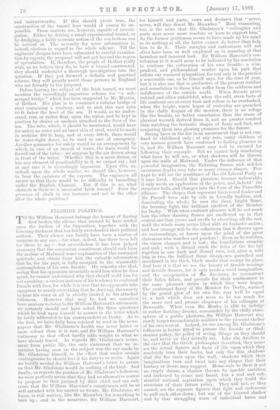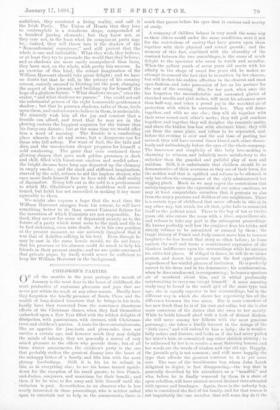FIRESIDE POLITICS.
TO Sir William Harcourt belongs the honour of having first broken the silence that seemed to have settled upon the leaders of the Opposition, together with the lowering darkness that has lately overclouded their political outlook. Their silence can hardly have been a matter of surprise to any one,—for what, indeed, has there been left for them to say ?—but nevertheless it has been judged necessary that the convenient constituent should seek from the recluse of Malwood some explanation of this unwonted quietude, and obtain from him the valuable information that he, for his part, is fully occupied in the seasonable contemplation of his own fireside. He remarks also that, seeing that his opponents invariably scold him when he does speak, he cannot understand why they should scold him for not speaking : a curious instance of his tendency to confound friends with foes, for while it is true that his opponents take exception to nearly everything that he does say, the anxiety to hear his voice at all is strictly limited to his attached followers. However that may be, had we ourselves been anxious to listen to Sir William Harcourt's utterances, we certainly should. not have asked the three questions which he took upon himself to answer in the letter which he lately addressed to his correspondent at Derby. As to the first, we have daily been rejoiced to read in the news- papers that Mr. Gladstone's health was never better 'or more robust than it is now, and Sir William Harcourt's testimony to that effect hardly adds weight to what we have already learnt. As regards Mr. Gladstone's retire- ment from public life, the only statement that we re- member having seen on the subject was the one made by Mr. Gladstone himself, to the effect that under certain contingencies he should feel it his duty to so retire. Again we hardly needed Sir William Harcourt's letter to assure us that Mr. Gladstone would do nothing of the kind. And finally, as regards the position of Mr. Gladstone's followers, we were perfectly aware that they had no alternative course to propose to that pursued by th"eir chief, and can only trust that Sir William Harcourt's constituents will be as well satisfied with his answer as we are. Mr. Gladstone, we know, is still waiting, like Mr. Micawber, for something to turn up ; and in the meantime, Sir William Harcourt, for himself and party, vows and declares that " never, never, will they desert Mr. Micawber." Most reassuring, too, is the news that Mr. Gladstone's " colleagues and party were never more resolute or keen to support him." As the former gentleman seems to have made up his mind. to do nothing at all, the latter cannot do better than help him to do it. Their energies and enthusiasm will not often have been so well employed as in assisting at that harmless and innocent task. Sir William Harcourt's con- tribution to it would seem to be indicated by his resolution to continue the cultivation of his own fireside : a wise, prudent, and philosophical resolve upon his part that enlists our warmest sympathies,.for not only is the practice a seasonable one, as he himself says, for the time of year, but it is also one that is productive of the greatest comfort and consolation to those who suffer from the coldness and indifference of the outside world. When friends prove unkind and allies unfaithful, when the cold, stern facts of life confront one at every turn and refuse to be overlooked, when the bright, warm hopes of yesterday are quenched by the chilly despair of the morrow, there is no refuge like the fireside, no better consolation than the sense ,of physical warmth derived from it, and no greater comfort than watching the fantastic shapes of flame and fuel, and conjuring them into glowing promises for the future. Seeing faces in the fire is an amusement that is not con- fined to childhood only ; at any rate, ninny children of very mature growth have confessed to find in; pleasure in it, and Sir William Harcourt may well be excused. for following their example. But we cannot help wondering what faces he will see, or what shadows will be thrown upon the walls of Malwood. Under the influence of that powerful imagination, the flickering flames and red-hot cavernous depths may take so many strange shapes. Per- haps he will see the semblance of the old Liberal Party as it once lived. Should that phantom become unbearable, it only needs an application of the poker, and, behold! the structure falls, and changes into the form of the Parnellite alliance. The shapes that represent his revered leader and Mr. Parnell burn side by side in friendly fashion, and, dominating the whole, he sees the clear, bright flame, the burning light, the brilliant intellect of the Member for Derby. With what exultant pleasure will be not mark how the other dancing flames are swallowed up in that central one that grows and swells by absorbing all the rest, until the whole room seems filled with its fantastic antics ; and how strange will be the reflections that it throws upon its surroundings, or forces upon the mind of the great statesman who watches and ponders ! Even as he watches, the vision changes and is lost ; the foundations crumble and sink ; with a dismal crash the sides of the fire fall together in one dark and dismal ruin, and, after a wild leap or two, the brilliant flame disappears, quenched and smothered in the thick, black smoke that usurps its place. And here it is that we see the beauty of fireside musings and fireside dreams, for it only needs a vivid imagination, and the co-operation of de fire-irons, to reconstruct their fallen fabric, and provide for their continuance in the same pleasant strain in which they wero begun. The exuberant fancy of the Member for Derby, warmed by the genial glow of his own fire, may well be equal to. a task which does not seem to be too much for the more cool and prosaic eloquence of his colleague at Newcastle. When' even Mr. Morley is able to indulge in rather darkling dreams, surrounded by the chilly atmo- sphere of a public platform, Sir William Harcourt may surely forget uncomfortable realities in the pleasant shelter of his own retreat. Indeed, no one among Mr. Gladstone's followers is better fitted to pursue the fireside or Glad- stonian policy, the policy of seeing things as they should be, and never as they actually are. Like the dwellers in the cave that the Greek philosopher described, they never see the actual figures and facts of life upon which they resolutely turn their backs, but only the dim shadows that the fire casts upon the wall,—shadows which their imaginations turn and twist into any shapes that their fantasy or desire may suggest. Home-rule to them is not an empty dream, a shadow thrown by ignoble ambition and darkened by crime. and fraud, but a real and sub- stantial national aspiration upon which they build the structure of their future policy. They will not, or they cannot, see the separate figures that fight and endeavour to pull each other down ; but out of the blurred shadow east by that struggling mass of individual hates and ambitions, they construct a living reality, and call it the Irish Party. The Union of Hearts that they love to contemplate is a wondrous shape, compounded of a hundred jarring elements ; but they know not, or they 'care not, in the least what its component parts may be,-indeed, they will throw into it the shadow of the " Nonconformist . conscience," and still protest that the whole is one and indivisible. What they wish, they believe, or at least they try to persuade the world that they believe ; and as shadows are more easily manipulated than facts, they have met, on the whole, with pretty fair success. In an exercise of this kind, the robust imagination of Sir William Harcourt should take great delight ; and we have no doubt but that he will, in the privacy of his country retreat, entirely succeed in blotting out the past, changing the aspect of the present, and building up for himself the hope of a. glorious future. " What shadows we are," cries the orator, " and what shadows we pursue." One could not call the substantial person of the right honourable gentleman a shadow ; but that he pursues shadows, talks of them, feeds upon them, and endeavours to believe in them, is undeniable. We sincerely wish him all the joy, and comfort that a fireside can afford, and trust that ho may see in the glowing embers the happiest auguries for the future that his fancy can dictate ; but at the same time we would offer him a word of warning. The fireside is a comforting place wherein to sit and muse, but a dangerous one for those who fall asleep. For want of fuel, the fire fails and dies, and the unconscious sleeper prepares for himself a cold awakening, The grate that once contained those glowing shapes, that gave such golden promises, is dark and chill, filled with burnt-out cinders and sordid ashes ; the bright dreams have long ago departed up the chimney in empty smoke ; and the stark and stiffened imagination, starved by the cold, refuses to aid the hapless sleeper, who once more finds himself face to face with the chill reality of discomfort, Being left out in the cold is a predicament to which Mr. Gladstone's party is doubtless well accus- tomed, but habit has not succeeded in making it any more agreeable to them.
We might also express a hope that the next time Sir William Harcourt mews from his retreat, he will have something better to do than correct Unionist fictions for the invention of which Unionists are not responsible. In- deed, they savour far more of Separatist anxiety as to the future of a party which must seem to the rank and file to be fast sickening, oven unto death. As to his own position at the present moment, no one seriously imagined that it was that of Achilles sulking in his tent. Even though he may be cast in the same heroic mould, we do not fancy that his presence or his absence could do much to help his friends in their present straits ; and we are quite convinced that private pique, by itself, would never be sufficient to keep Sir William Harcourt in the background.







































 Previous page
Previous page